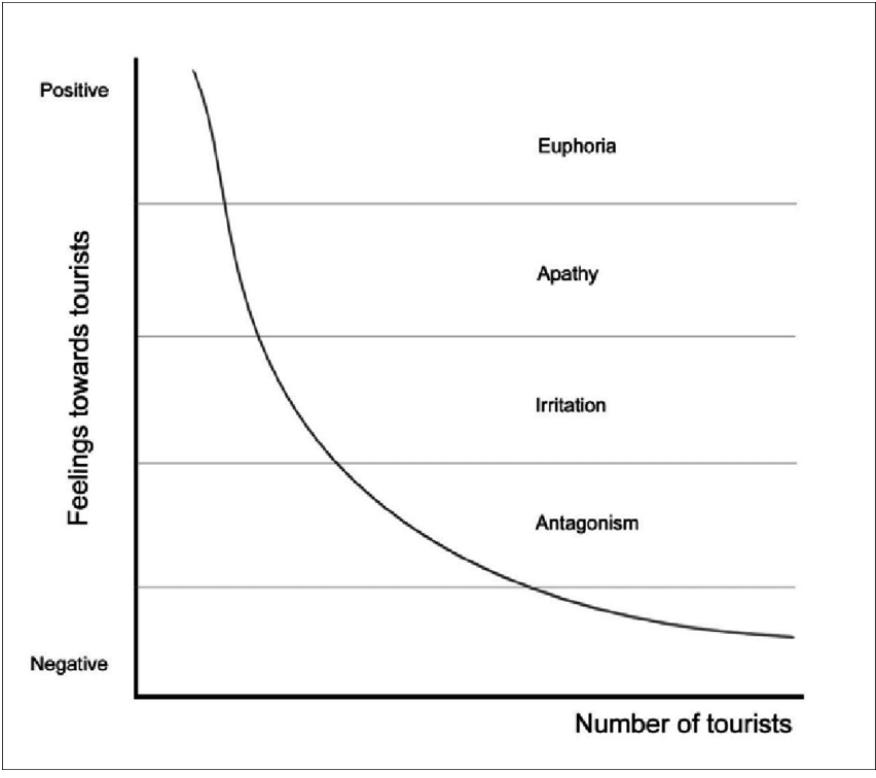The rise of anti-tourism in a globalised world
08 October 2024

Over the summer during the British holidaying season, the media was awash with disturbing videos of Brits behaving badly on holiday, alongside growing ‘anti-tourist movements’ at home and abroad.
The tourism industry is now facing serious pressure to respond and understand these issues before the love affair between Brits and our much loved holiday resorts goes sour.
In this piece, Dr Donna Poade explores the tensions that may have ignited such passion towards ‘anti-tourism’ through a well-established tourism academic model - Doxey’s Irritation Index (1975) using Cornwall and Barcelona as two tourist locations that epitomise overtourism.
As a resident of a small Cornish seaside town, the impact of tourism is visceral. The county – which has a population of around 570,000 - receives approximately 5 million additional visitors per year, mainly in ‘honeypot’ locations such as St Ives and Newquay (www.visitcornwall.com). The dramatic population increase has significant negative impacts such as increased congestion, pollution, increased crime and anti-social behaviour, and shared limited resources such as restaurants and medical facilities. Even out of season the impact of tourism remains a visible irritant with empty houses highlighting the hollowing out of communities and the lack of housing stock for locals to live in.

In Cornwall this frustration has long manifested itself in local slang. Visitors are referred to as ‘emmets’ meaning ants as a swarm, milling around and driving along narrow lanes. While it is muttered with irritation at the height of the season, locals also find gallows humour by delighting in those moments when outsiders fall foul of the natural beauty. Popular Cornish Instagram meme account ‘Jam and Meme’ posts with glee when a visitor’s car is marooned on the beach and swallowed up by the incoming tide.
Further afield, this irritation has transcended into visible hostility and anger towards visitors. In Barcelona Brits have been sprayed with water amid shouts of ‘tourists go home’ (https://www.independent.co.uk/travel/news-and-advice/barcelona-spain-tourists-water-pistol-b2577116.html), highlighting the escalating tension. This long fermenting frustration has led to recent legislation to ban tourists from renting holiday apartments by 2028. Elsewhere the ‘anti-tourist movement’ is growing with large protests in Malaga, the Canary Islands, Athens and Mallorca.
Concerns are growing that this hostility could spread and visitors could turn their back on many popular resorts (https://www.telegraph.co.uk/travel/advice/hostile-holiday-destination-british-tourists). This short-term social victory could spell a disastrous impact however for the tourism industry worldwide and the economic models that support these communities.
What might be some of the reasons behind this anti-tourism stance and tensions between local communities and visitors?
One suggested theory is Doxey’s Irritation Index, a model established in 1975 and well known in tourism academic circles. It is based on understanding how host destinations feel about visitors and the development of tourism in the different stages of a destination’s life cycle. At the beginning of tourism development, the host community are often euphoric about the potential that tourism development offers, particularly in economic terms. However, as time progresses, and visitor numbers grow exponentially, so the irritation increases. This results in the destination experiencing stagnation or decline.
Obviously, not all people feel the same, although as the recent demonstrations show, there are people who feel very strongly indeed against tourism, for example in Barcelona. Barcelona is the most visited city in Spain receiving 20 times more visitors than the number of people that live there (Barcelona City Council 2024). Media reports highlight that local communities are incensed with mass tourism in their city. Reports of rapidly rising tourism which is unsustainable and creating havoc with overstretched resources being shared, inflated house prices and erosion of the environment and communities. (https://reasonstobecheerful.world/barcelona-fighting-overtourism)
 Source: Adapted from Reisinger (2009:221)
Source: Adapted from Reisinger (2009:221)
So, what can be done to ease tensions towards embracing tourism?
Obviously, every individual within a host community has their own views on tourism, experiences with visitors and engagement with the industry. Tourism is a complex, multi-faceted and fraught with political, economic, environmental and social factors to balance. One perspective is to look at the market of visitors themselves and the responsibility they have when holidaying. A common charge against tourism stems from visitors who behave badly on holiday with little regard for the local community or the environment. However, importantly there is a growing segment of visitors who now wish to ‘holiday responsibly’. These people are more aware of their environmental and social impact and wish to engage in more sustainable practices as visitors. Attracting more of this market is suggested as one solution put forward to minimise tourism tensions.
Further, global initiatives are being put forward to consider how tourism can improve the quality of life for entire communities. The Happy Planet Index (www.happyplanetindex.org) measures sustainable wellbeing and there are other various wellbeing agendas with the aim of engaging all stakeholders. Other suggestions include the opening of new destinations such as Albania with its rich heritage and cultural assets.
What is certain is that relationships in tourism are complex with irritations along the way – involving the local community and thinking about your responsibility as a visitor is one way to avoid irritation turning into hostility and creating a truly ‘all-inclusive’ tourist destination.





